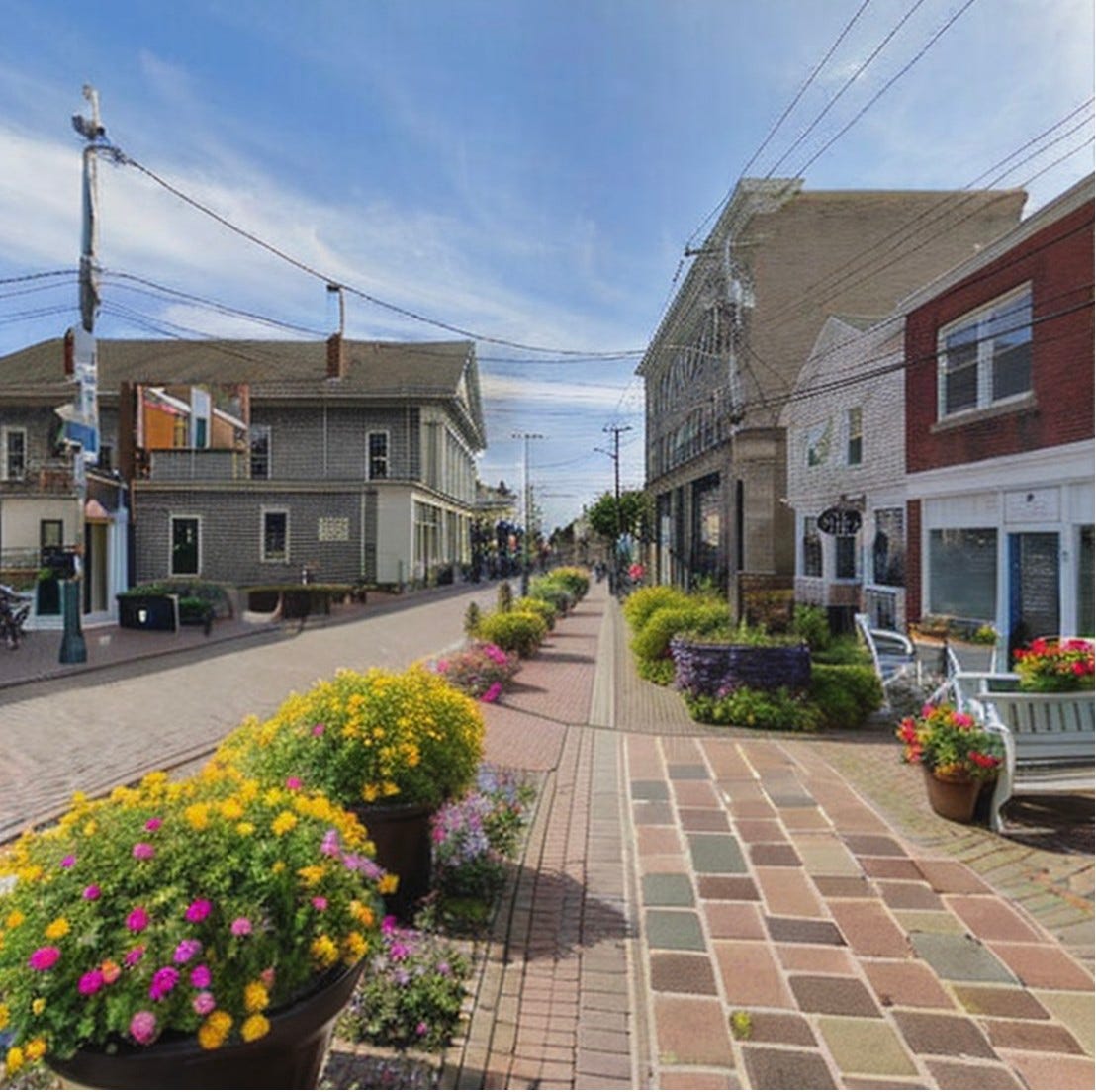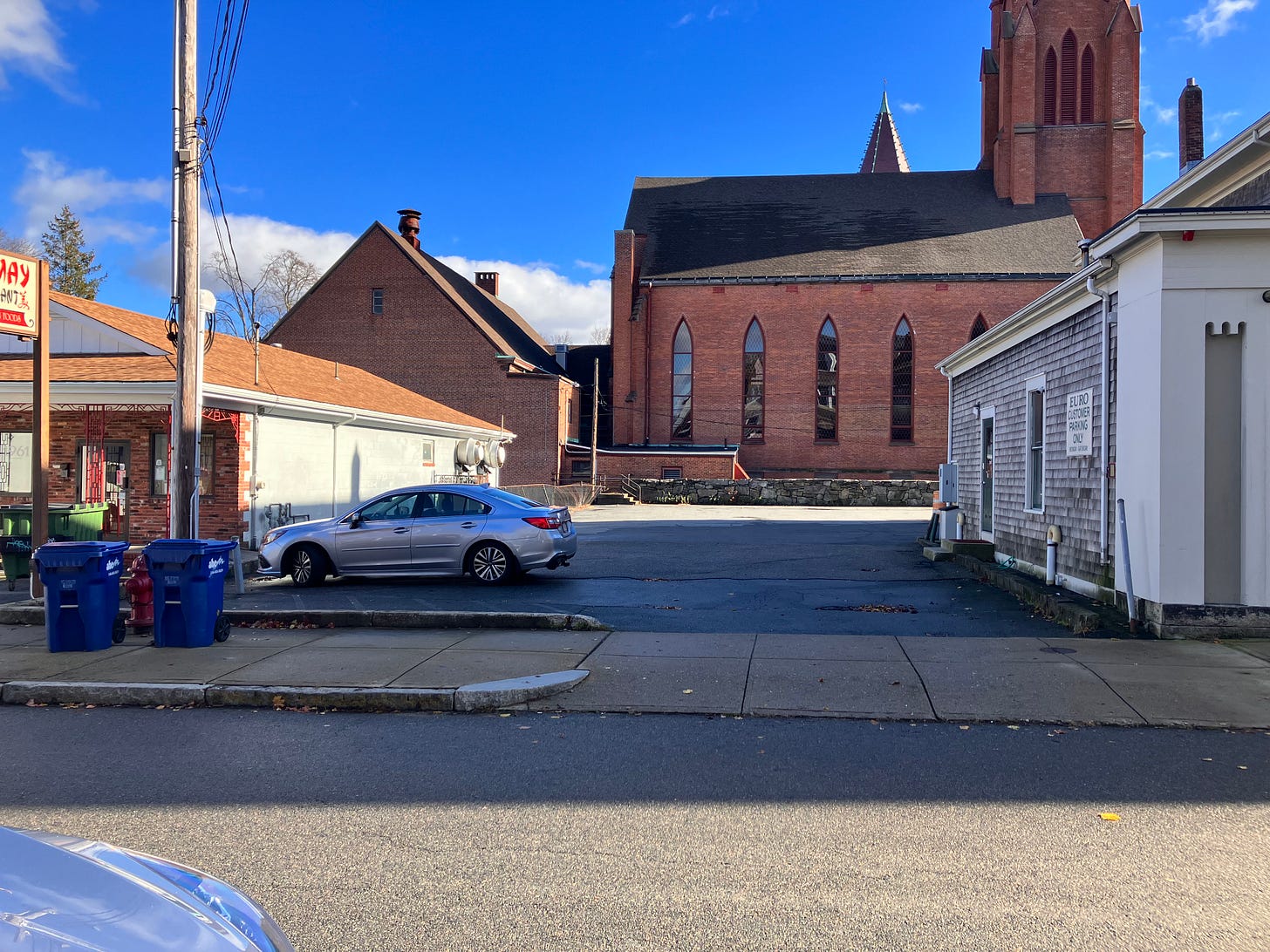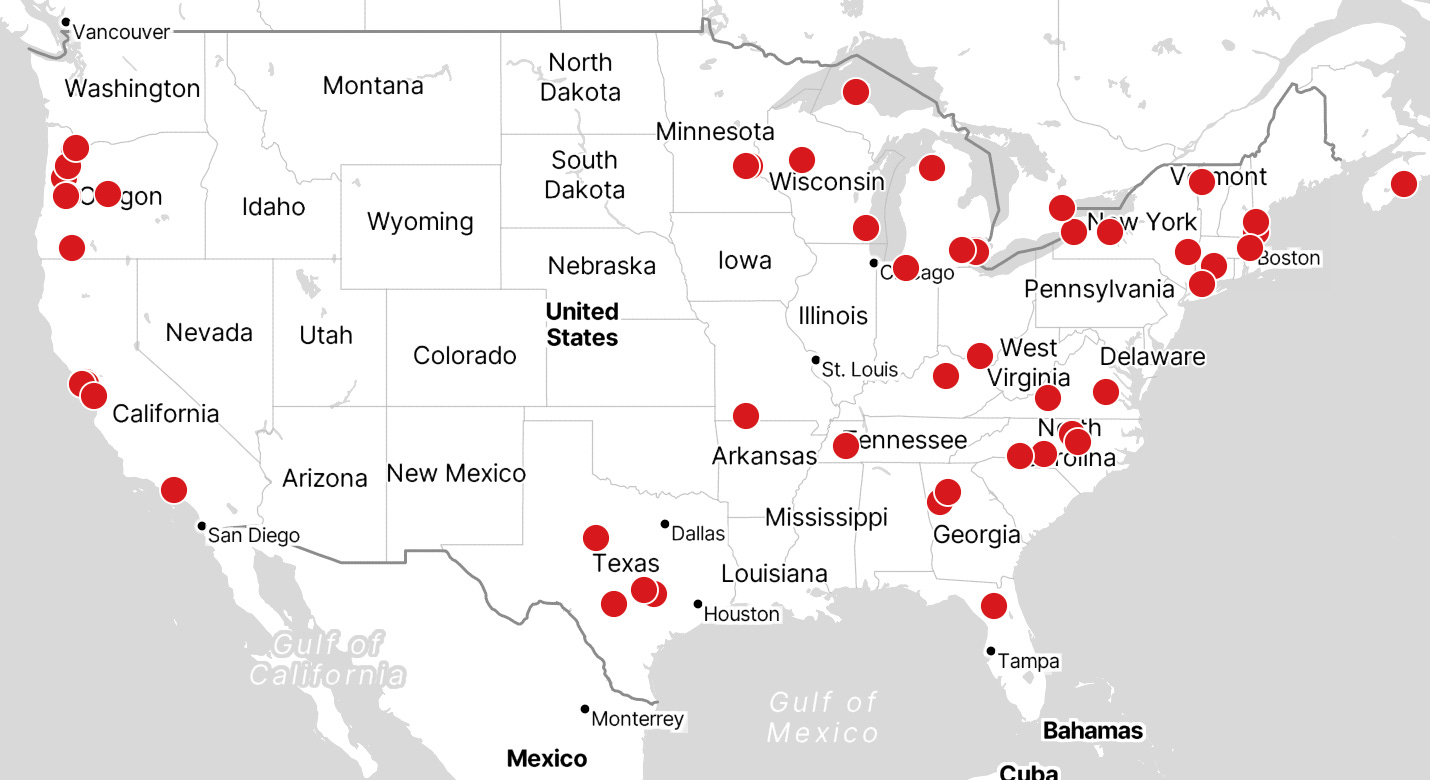We Don’t Need a (Parking) Lot
As I write this I gaze out at the parking lot of the Euro Phoenix Store (to right), a popular boutique that’s an anchor of our town center. It’s across the street from the Sip N’ Sit, so I see it most weekdays. The lot is usually empty. The few cars I see there are often the cars of employees in the shop. While plenty of people drive to visit the store, many of them park for 15 minutes on the ample street parking in the area.
As I’ve outlined previously, downtown parcels like the one this store occupies are the most valuable land in the town on a per-acre basis. This tiny .35-acre lot that includes the beautiful building on the right currently generates about $10K in annual tax revenue for the town. That’s $28K per acre in tax revenue.
About 75% of this property is currently taken up by surface parking. Imagine that the owner of this property built a second store behind the existing one, taking up an additional 25%. It’s not hard to picture a small mixed-use building, with retail below and apartments above, fitting nicely in this spot. The property would increase significantly in value-- potentially doubling the value of improvements to the land. In this scenario, the town gains an additional $6-10K annually in tax revenue, with no additional infrastructure costs. It also gets more housing. Current residents get another nice place to walk to and a nicer-looking Main St. Increased foot traffic and a greater number of residents make businesses in the neighborhood more viable, thus increasing the value of those properties.
It’s not hard to imagine this type of growth because this, after all, is how this downtown area evolved in the first place-- successful bets in the form of businesses and improvements increasing land values and spurring more investment in the surrounding area. The town should be doing everything it can to cultivate this virtuous cycle. What it does instead is mandate that much of this land be set aside for free parking, most of which goes unused. Here’s our zoning code:
While the Euro Phoenix is likely grandfathered into a lower minimum, any plans to change its use or develop the land further would have to provide far more off-street parking than would ever be used. In fact, for every 250 square feet of retail, a developer would have to provide about 280 square feet of space for parking (this includes room for vehicles to access spaces). This means that many projects that would represent the next increment of development for our downtown don’t pencil out. Parking mandates kill investment in our downtown areas and impoverish our community.

I know I talk a lot about parking. But that’s because, in the final calculus, arbitrary parking minimums and the fear of parking scarcity are the reasons we can’t have nice things. To my fellow residents of Fairhaven:
If you’re a town employee and you want the town to be able to pay higher salaries
If you want to preserve our open space and natural resources
If you want great businesses within walking distance of your neighborhood
If you have fond memories of local shops in Fairhaven that no longer exist
If you want more funding for services in town without annual overrides and larger tax hikes
If you want your aging parents to have a place to live
If you want your adult kids to be able to find an affordable starter home
If you want to reduce traffic congestion on the roads you drive
If you want development here to be done by many hands, including by people who live in our community
If you value diversity and want people of all backgrounds and ages to be able to live here
Then for God’s sake join me in calling for an end to minimum parking requirements!
And, to make sure I’m being fair:
If your primary concern is making sure there are always ample parking spaces right near anywhere you want to be…
Don’t worry— we’re a long way off from having actual parking scarcity. And if parking does get tight, you should push to enshrine your (currently nonexistent) right to parking in a residential permit parking system, whereby current residents are granted parking permits. That’s a positive way forward— a way that generates revenue for the town and encourages smart development.
Know that eliminating minimums doesn’t mean that developers won’t still add off-street parking to some projects. It’s just that they’ll be able to more effectively weigh the need for parking against the other potential uses of the space.
A Plea to Town Leaders
To town officials, if you think that this is too radical an idea, know that in recent history, zoning changes are invariably headed in the direction of eliminating minimums. The towns that act decisively and aggressively to fix bad zoning will be first in line for the type of investment that builds, rather than kills wealth.
By eliminating parking mandates, we’ll be joining Mass cities and towns like…
Cambridge, where the city council voted 8-1 in favor of eliminating all minimum parking requirements for residential and commercial developments citywide.
Provincetown, which eliminated parking minimums in its commercial district
Dennis, which reduced minimums by 50% and established a maximum parking limit of 5 spaces per 1,000 feet
Framingham and Natick, which eliminated parking minimums for ground-floor commercial
Norwood, which cut minimums in half and waived any parking requirements for small projects
Brookline which reduced parking minimums near transit and allows the ZBA to waive any parking requirements for projects that will add housing units
Lowell, which eliminated parking minimums for up to 10 units of housing in the downtown mixed-use zone (DMU)
Boston, which has citywide maximums and recently passed a resolution eliminating parking minimums for developments with more than 60% affordable housing
Not to mention 1400 other places around the country that have already implemented parking reforms (parking data courtesy of the Parking Reform Network).
It’s Time to Stop Coasting Downhill
There is no “keep things like they are” option. The stagnation of our walkable downtown areas wasn’t some inevitable byproduct of progress. It was the result of a failed suburban experiment that sought to freeze the evolution of our core neighborhoods and push all development toward a car-dependent pattern along the highways. No matter how much lip service town officials give to supporting our downtown areas, doing nothing about our bad zoning will encourage this failed experiment to continue. Doing nothing means more drive-thru’s, fast food, curb cuts on Route 6, bigger stroads, and less… Fairhaven. It means isolated seniors who are more prone to falls. It means more fights over overrides and more salary cuts and layoffs for town employees.
The town won’t win just by chasing grants or shiny new things. It will win when it invests in what has worked here in the past. Our core neighborhoods are built to last, we just need to let them grow naturally in the way that made them remarkable in the first place.
Remember what you come here for. It wasn’t the parking.






